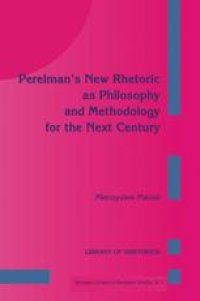
Ebook: Perelman’s New Rhetoric as Philosophy and Methodology for the Next Century
Author: Mieczyslaw Maneli (auth.)
- Tags: Philosophy, Political Philosophy, Philosophy of Law, Ethics, Logic
- Series: Library of Rhetorics 1
- Year: 1994
- Publisher: Springer Netherlands
- Edition: 1
- Language: English
- pdf
Both Perelman's collaborators, Professors Haarscher and Ingber, shared with me their deep personal insights about origins, birth and phases of the develop ment of the New Rhetoric. Without their good will, advice and creative com ments, my personal knowledge would have been narrower. I am grateful to the Chaim Perelman Foundation for their grant which enabled me to cover my expenses of collecting materials, editing and preparing the manuscript. Professor Michel Meyer was very instrumental in the negotiations with the publisher. Mr. Raphael Lipski, treasurer of the Perelman Foundation, spent many hours with me, and shared his remembrances of Perelman's personality, his social and political activity. lowe special thanks to Dr. Richard Kramer, whose friendship I cherish for a quarter of a century. He read and edited not only the entire text of the book, but he offered many critical remarks and constructive suggestions which helped me to revise my own ideas and to formulate them more clearly and precisely. The first critical reader and editor was as usual Mrs. Elizabeth Previti. Professor Elzbieta Ettinger-Chodakowska, MIT, read this entire manuscript and shared with me her impressions. lowe special gratitude to my dear friend, Mrs. Stephanie Silvers for her steady help and moral support. Needless to say, I am solely responsible for all the deficiencies of this book.
This book presents the New Theory of Argumentation, popularly known as the New Rhetoric, as an innovative theoretical and methodological system which will become increasingly important. Two factors determine the importance of this philosophy: (1) The collapse of all modern ideologies, many sociopolitical systems and their associated philosophies, whether of the right or the left, means that the era of the quick, dogmatic perception of how to force people to feel free and happy is over. (2) New forms and institutions of social and economic life must be found among the wreckage. The solutions sought must work best for the greatest number of people and must be flexible enough to allow the reinterpretation of all our determinations, from the very beginning.
The New Rhetoric rejects all absolutist and dogmatic ideas. But neither does it support absolute relativism. It constitutes a method for the endless search for truthful explanations and for enlightened practical activity. Truth is only the process of approaching it. While critical of formal logic, the New Rhetoric develops the concepts of `other', `experimental', `flexible', and `logic of good sense'. The introduction and elaboration of the concept of `reasonableness' is presented as a milestone in the evolution of scientific methodology.
The New Rhetoric has overcome the traditional contradictions between logic, rationalism and dialectic and has laid new foundations for a modern theory of morality, law, legal interpretation, and human rights.
This book discusses such problems as: new moral notions, the new dilemma of Cain, the spurious notions of 'centrism', Antigone's new arguments, 'argumentation is not bargaining', new foundations of tolerance and justice. It ends with a section on 'Resolutions for the New Century', written in the spirit of traditional enlightenment, rule of reason and humanism, but which goes beyond them.